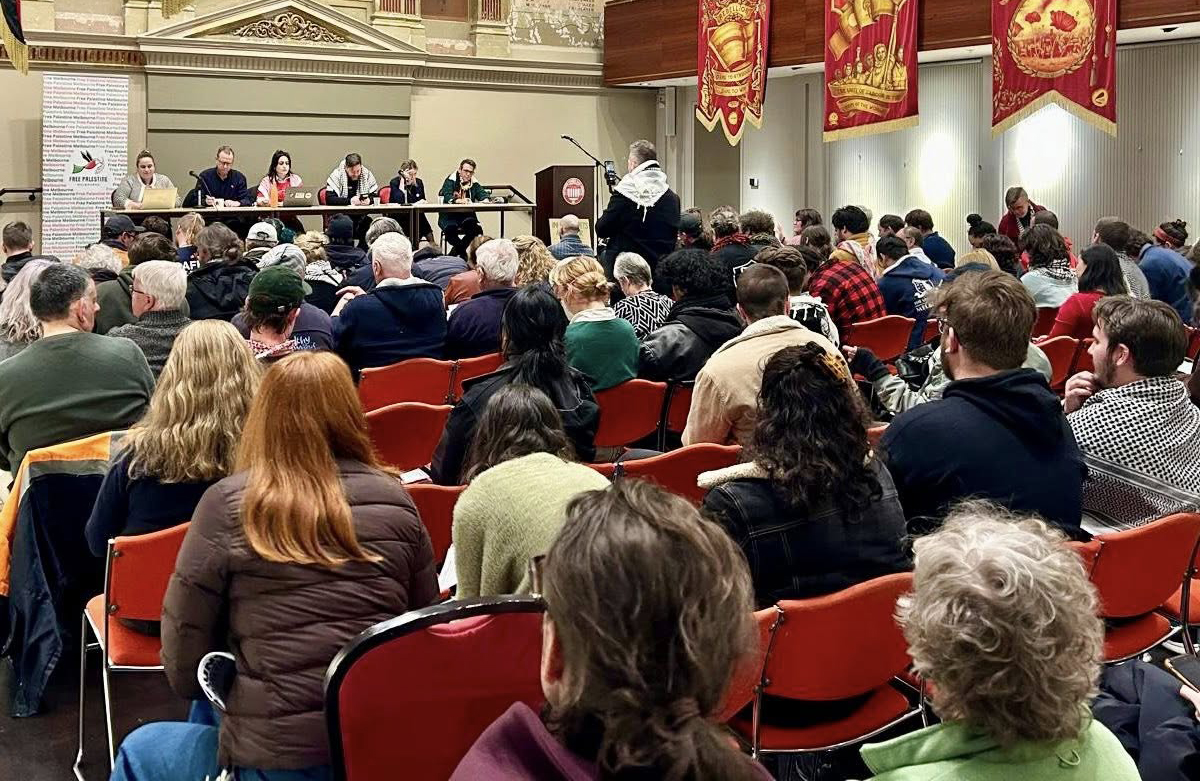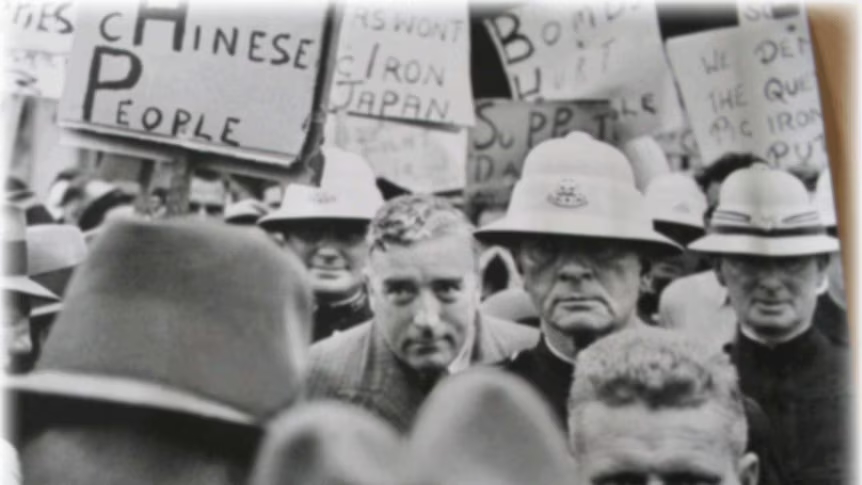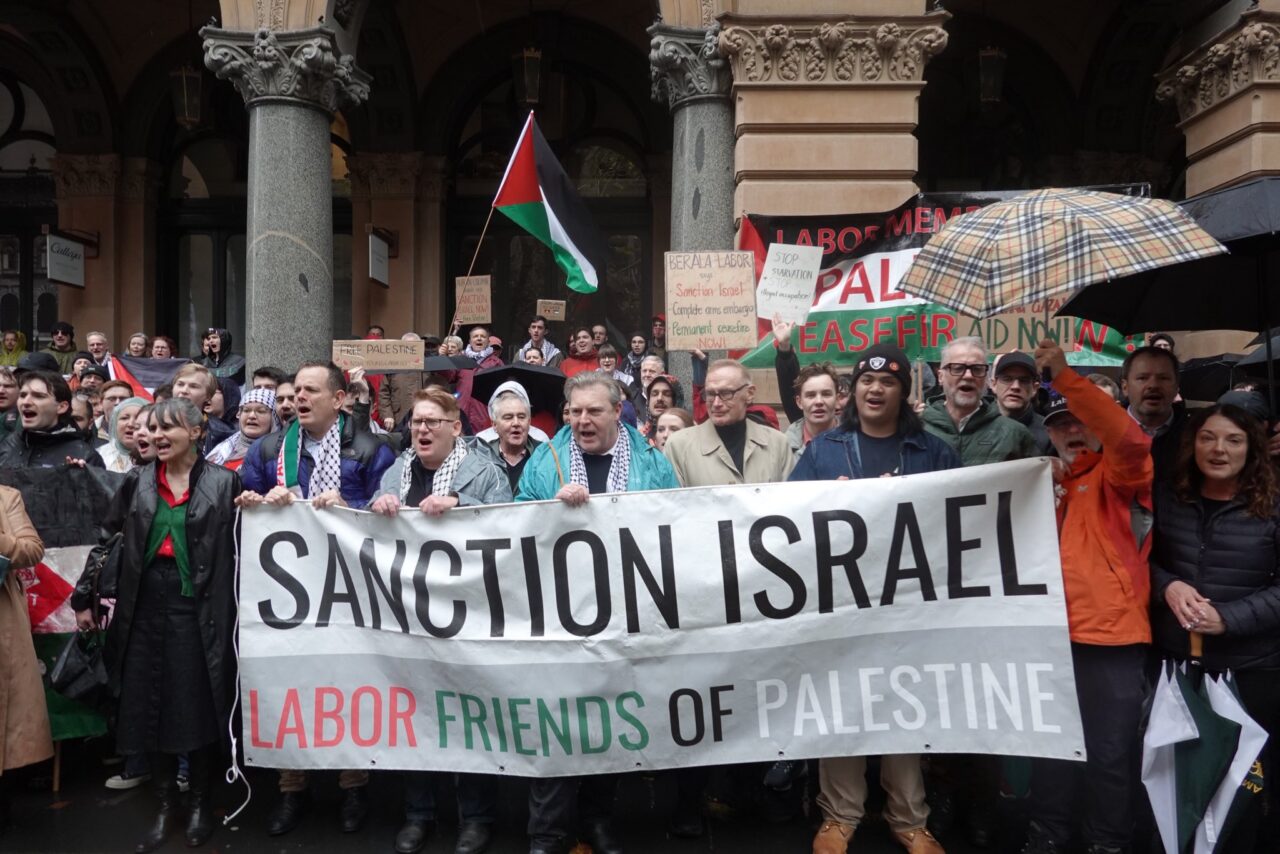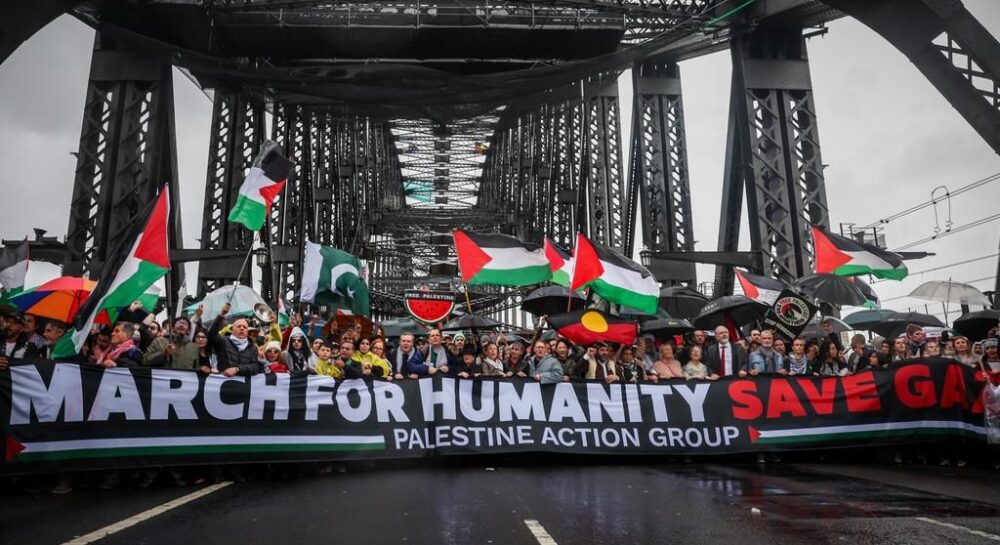In the wake of the historic Sydney Harbour Bridge ‘March for Humanity’ on 2 August, the Palestine solidarity movement can build a truly mass movement with a strong working-class character, representing the communities in our cities and regions that often don’t take such action, writes Marcus Strom.
More than 200,000 people came out in the pouring rain to express indignation and horror at the ongoing genocide in Gaza and Australia’s continued light touch and connivance with Israel, which is carrying out this monstrous calamity.
It was one of the biggest demonstrations in Australian history.
It was followed up on 24 August with hundreds of thousands marching in more than 40 cities and towns across Australia. People are finding their voice and courage to speak out against the horrific crimes being committed and the refusal of the Australian government to impose sanctions on the genocidal Israeli regime.
With weasel words and both-sideism the best that Anthony Albanese and Penny Wong had mustered, the dam broke after the NSW Labor government and the NSW Police tried to ban the demonstration. This ensured people turned out and turn out they did.
Since then, Albanese has said Australia will recognise a Palestinian state. While too little too late, and full of caveats that mean such a state will be little more than a Bantustan, this outcome is still a victory of the Palestine solidarity movement.
The response from Israel? Harsher condemnation from Netanyahu of Albanese than Albanese has managed to criticise a murderous genocidal bloodbath.
Now, quite rightly, activists are looking to deepen the solidarity movement and calling on the trade unions to act.
Why won’t the unions do more?

The meeting endorsed the national rallies planned for 24 August.
Many union leaders have been reluctant to speak out against the genocide, fearful of the cynically weaponised antisemitism scare campaign. Or worse, unions that organise workers in the arms industry won’t speak out against militarism of any kind.
Some union leaders have talked the talk and even walked the walk being arrested at pickets, but have they done the hard work to win their membership over to their speechifying views? You ask the question, you know the answer.
Most of the union action for Palestine has been initiated by active rank and file groups, mainly organised in the education, health and human services sectors. In Victoria, this has led to Trades Hall officially backing and mobilising a “Unions for Peace” contingent at the 24 August National March for Palestine.
Those demonstrations saw more banners and union leaders out than ever before. ACTU secretary Sally McManus and Unions NSW secretary Mark Morey both turned up to the Sydney demonstration.
My union MEAA has now given the go-ahead for union banners to be available to members on Palestine demonstrations. Many journalist members participated in a powerful video in remembrance of the more than 170 journalists and media workers killed by Israel last year alone.
However, most union leaderships are doing little to build stronger actions such as work-day mobilisations or direct industrial bans on trade with Israel, particularly in industries that could impact the arms trade.
Yet some on the sectarian left pose against the lack of action by the union leaders the need for immediate political strikes against genocide. If only it were as easy as passing a motion in a union branch.
Of course, Palestine activists need to call out the inaction of union leaders and careerists – but you don’t counterpose this by demanding one-day political strikes in meetings where you have done no preparation to win, you know you will lose the vote so you can storm off in a huff and feel morally superior.
This is exactly what happened at the University of Sydney branch of the NTEU, with Socialist Alternative members calling for a 24-hour strike for Gaza with two weeks’ notice. The movers knew they’d lose, but didn’t care. It was all a leftist pose.
It is true that union leaders hide behind ‘but the workers aren’t ready’. But it is also true that workers aren’t ready! The problem is that union leaders are doing almost nothing to prepare workers to take more significant action.
Political strikes: difficult and limited
Building political strike action is hugely difficult. How often did political strikes happen in Australia even at the height of union power and a (small) mass Communist Party?
The number of examples is tiny. Some examples: action against South African apartheid, blockade of arms to the Dutch in Indonesia, Gurindji walkoff at Wave Hill, a one-day railway workers’ strike in 1976 against uranium transportation and the famous Dalfram dispute in 1938, when Illawarra workers refused to ship pig iron to Japan.
Political strikes are even more difficult now for a few reasons:
- the union movement (now at under 10% in the private sector) is weak and its leadership generally careerist and there is no recent history of building such work.
- there is no mass Communist Party and no functional Labor left that is committed to mass action.
- ‘rank and filism’ on its own is a dead-end strategy unless it is tied to building a mass party (not one, two, many ‘rank and file’ groups aligned with sects).
- importantly, the political consciousness and historical perspective to take political strike action (let alone economic strike action) doesn’t exist in the working class.
- critically, even mass political strikes organised by a mass communist party are only a partial response, without generalising political opposition to the constitutional system.
So, the main task isn’t demanding the impossible of ‘union tops’ to feel morally superior and harden up your new sect recruits. It is doing the hard work to unite the left and the working class around a democratic, radical and socialist program so that its actions can have meaning and impact at mass scale, not just in the workplace but across society.
Further, Palestine solidarity is becoming a mass movement. It made very little impact at the May federal election. But the movement is growing and the response of the working class to this cannot be limited to trade unionist responses. This mass movement needs to find a political home to make its nascent anti-imperialist sentiment into a mass political alternative to the pro-imperialist political establishment.

Splitters!
Some of the limitation for building a movement is the ongoing internecine nature of the Marxist left outside the ALP. Each little grouplet has its own ‘united front’ to in which to keep its recruits busy. There is no single authoritative centre of socialists (such as a communist party) to direct this work.
This is heightened in places where groups like Socialist Alternative and Solidarity are at loggerheads. Both groups come from the Tony Cliff inspired International Socialist tendency based in London. Socialist Alternative (the larger group) is more focused on the Palestine activist community and supports excluding ALP MPs from platforms. Solidarity has its own front group that sputters in and out of life – Trade Unionists for Palestine – that is more oriented to the ‘left’ union bureaucracy.
Solidarity in NSW through the NTEU called for a union-day of action on 10 September. This has been endorsed by a few union branches but ignored by most of the movement. In Victoria, Socialist Alternative has taken up the 10 September call, seeking support for a planned unofficial walk out by ASU workers in some legal services and community centres on the day. Again, with similar results.
Sect pathology and lack of unity is hampering scope of solidarity action. Socialist Alternative seems to want to keep its political activity in this movement separate from its electoral work through the newly launched Socialist Party. Again, limiting prospects.
The perspective of having demonstration after demonstration did not build the movement – it was useful in the sense it created a space for the movement to move into when people actually mobilised. But the Palestine Action Group approach generally narrowed mobilisation, as important as the marches have been.
The main mobilisers for the historic and fantastic Sydney Harbour Bridge demonstration were Netanyahu, Trump, Minns and the NSW Police.
Yes, it was useful that the PAG had a track record of holding demonstrations, but the ‘mass line’ of the Sydney Harbour Bridge action was forced on PAG. We need to make this mass line a permanent and growing feature of the movement.
Until this time, putting Labor MPs on the podium or at the front of demonstrations was opposed. With more than 200 ALP members marching under the Labor Friends of Palestine banner, with NSW ‘soft left’ MPs, plus Tony Sheldon, Ed Husic, Bob Carr marching (among others), they were moved to the front with Greens MPs and community leaders.
It isn’t the be-all and end-all to get dissident ALP MPs speaking at demonstrations. But our strategy should be to build a mass character to the movement, putting dissident ALP MPs on the platform is a useful way to open up the space for a mass movement.
NSW ‘soft left’ MP, Anthony D’Adam has attended almost every Sydney Palestine solidarity march. His office is the backbone of Labor Friends of Palestine (NSW). Yet the Palestine Action Group refuses to let him speak at demonstrations, effectively calling on him to resign from the ALP if he wants to speak.
There are only two people more determined to stop Anthony D’Adam speaking at these demonstrations than the Palestine Action Group, and they are NSW Premier Chris Minns and Prime Minister Anthony Albanese.

Mass character, democratic movement
How does the movement define itself? How does it judge victories, losses? How does it discuss strategy that can involve masses of people? Without a democratic structure and a way to hold debate, discuss strategy and move together united, this is unclear. Activism becomes everything.
Yes, we need to get unions mobilising members – but that takes patient education to win the mass of the membership, not just declaratory motions at small branch meetings.
The impetus now should be to build a democratic movement for Palestine solidarity that has a mass character.
The ‘ad hoc’ organising committee that called the 24 August national marches needs to be democratised. A national conference should be planned for; recallable delegates from community groups, socialist groups, ALP branches, union branches should attend and vote at such a conference. The organising committee needs to be accountable and authoritative.
A unifying and militant action program should be agreed, which could include:
- Sanctions against Israel
- Expel the Israeli ambassador
- Australia to exit the F35 fighter jet program
- No arms export licences to Israel
- Support moves to indict war criminals
- Investigate Australians returning from active IDF service for war crimes.
Our movement must force Australia out of the pro-Israel line up. No easy task, but is one we need to act on hand-in-hand with our fight to rebuild working-class political consciousness and the basis for a mass revolutionary party.

